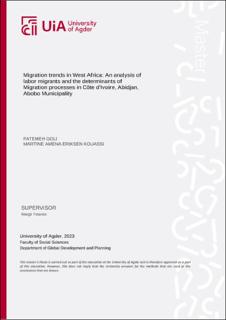Migration trends in West Africa: An analysis of labor migrants and the determinants of Migration processes in Côte d'Ivoire, Abidjan, Abobo Municipality
Master thesis
Permanent lenke
https://hdl.handle.net/11250/3083649Utgivelsesdato
2023Metadata
Vis full innførselSamlinger
Sammendrag
Migration is a complex phenomenon that continues to shape societies worldwide. Despite the challenges of significant poverty, rapid urbanization, and limited job opportunities, the municipality of Abobo in Côte d'Ivoire remains an attractive destination for migrants. This enduring appeal suggests strong motivations and potential advantages associated with migration. Consequently, this master's thesis examines migration dynamics, determinants, and experiences within the Abobo municipality.
This study employs a case study framework and a qualitative research strategy to tackle the research problem and explore the research questions. By employing these methods, the study seeks to accomplish its research objectives, providing a comprehensive understanding of the motivations, experiences, opportunities, and challenges encountered by migrants in the Abobo municipality. Through a multi-level analysis encompassing macro, meso, and micro factors, the study provides valuable insights into the complex interplay between various elements that shape migration characteristics in the municipality.
At the macro level, migration theories such as the push and pull framework and the Neo-Classical economic theory are employed to explore the motivations and determinants of migration. The analysis reveals that the migrant respondents were attracted to the Abobo municipality due to the perceived availability of higher-paying jobs, improved work conditions, and business opportunities compared to their countries of origin. The push factors, such as unfavorable economic circumstances and limited job prospects in their home countries, drove the migrant respondents towards seeking a better life in Abobo.
At the meso level, the study examines the social and economic conditions that influence regional and community migration patterns. It highlights the role of social ties and networks for labor migrants in Abobo. The findings demonstrate that migrants rely on strong and weak ties in their networks for decision-making, employment opportunities, and housing. However, the study reveals barriers to well-paid work, including corruption and lack of documentation, underscoring the complex nature of migration and indicating that social networks alone are insufficient to overcome these obstacles.
Furthermore, the study uncovers the importance of social capital formed among migrant respondents in Abobo. These networks serve as vital sources of support and help mitigate the risks associated with migration, aligning with the principles of social capital theory. Nevertheless, the study emphasizes the need to address structural factors and systemic issues within the municipality to improve job opportunities and overall development for migrants.
At the micro level, the study explores individual elements that influence migration decisions. It provides a valuable understanding of the factors that drive migrants to choose Abobo municipality as their destination, moving beyond economic reasons. The findings demonstrate that economic factors, social networks, policy frameworks, and migration laws shape migration decisions. The study highlights the role of the entire household in decision-making as migrants seek to enhance their own and their family's financial situation.
Moreover, the study uncovers the opportunities and challenges faced by migrants in the Abobo municipality. It reveals that while employment opportunities in Abobo are perceived as advantageous compared to migrants' countries of origin, access to well-paid jobs is contingent on possessing legal identification/documentation. Unfortunately, the majority of migrant respondents lack such documentation. The study also highlights the challenges associated with employment in the formal sector, where legal documentation is crucial but often inaccessible to migrants. Consequently, many migrants are compelled to seek informal sector jobs, which offer less stability and lower wages. The study underscores how poverty among respondents further hinders their access to well-paid jobs and perpetuates their limited ability to obtain required legal documents.
